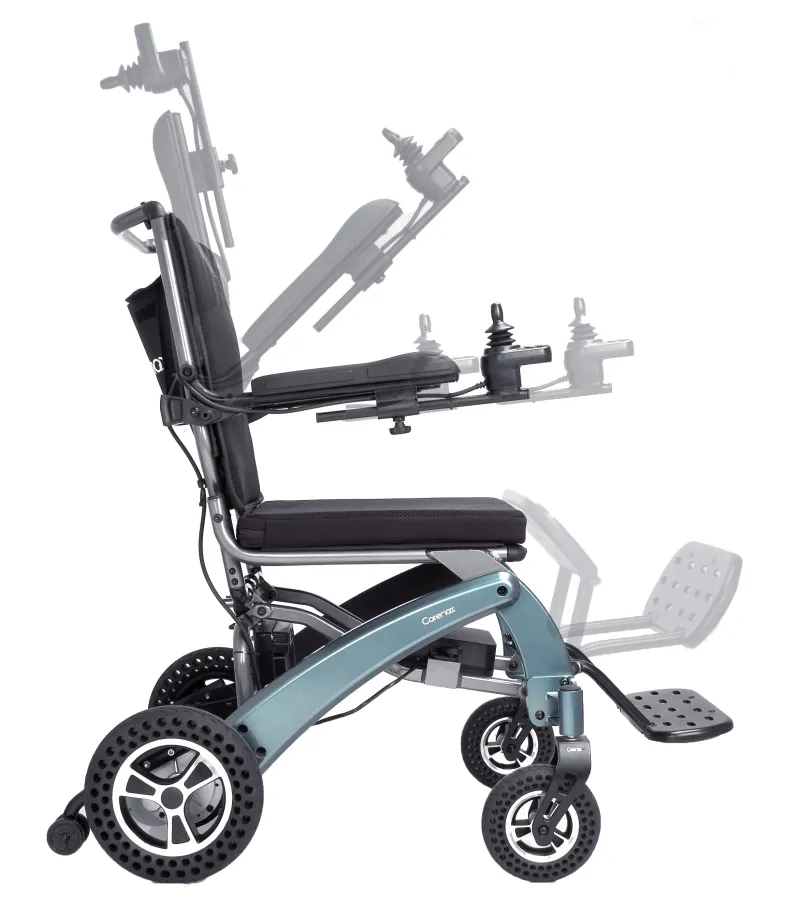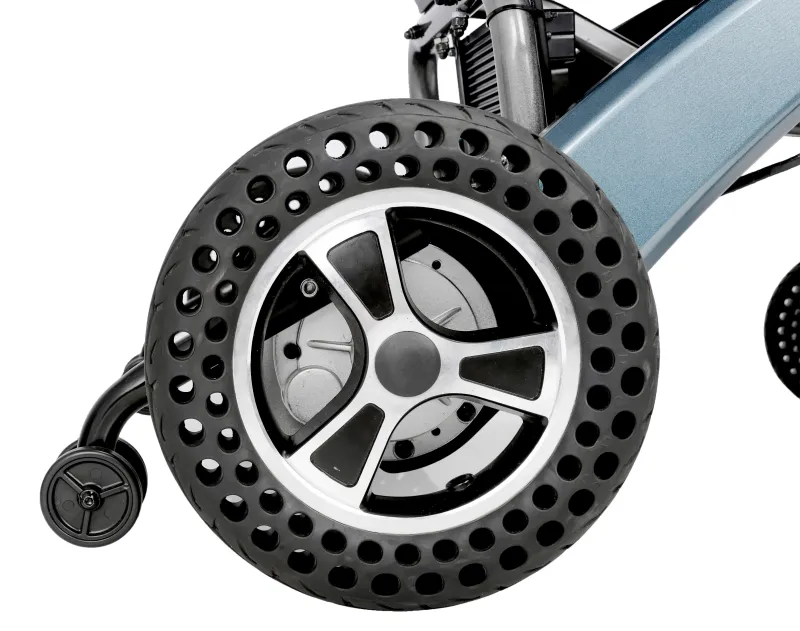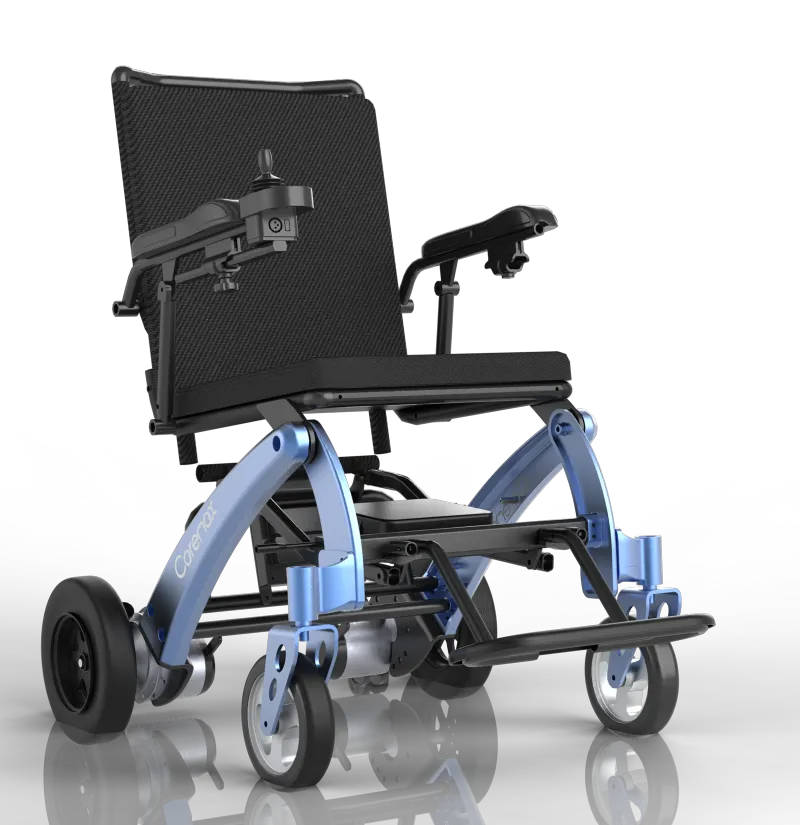
Cos'è una sedia a rotelle elettrica? Quali sono i loro pro e contro?
2024-07-16 15:30
As an important assistive device, electric wheelchairs have gradually entered people's vision and are widely used in daily life. Electric wheelchairs provide great convenience and autonomy for people with limited mobility, but their advantages and disadvantages cannot be ignored.
This article will explore the definition, advantages and disadvantages of powered wheelchairs and actual cases in their use to help readers fully understand this important device.

What is an electric wheelchairs?
Electric wheelchairs are wheelchairs driven by electric motors. Users can operate them through control panels or joysticks to achieve free movement in indoor and outdoor environments. Electric wheelchairs are designed to provide greater independence and freedom of movement for people whose mobility is limited due to various reasons (such as old age, illness, disability, etc.).
Components of electric wheelchairs
Electric wheelchairs are mainly composed of the following parts:
1. Motor: Provides power to enable the wheelchair to move.
2. Control system: Including control panels, joysticks, etc., used to control the wheelchair's forward, backward, steering and other operations.
3. Battery: Provides power support for the motor and control system.
4. Frame and seat: provide support and a comfortable sitting position for the user.
5. Wheels: including drive wheels and steering wheels, ensuring the stability and flexibility of the wheelchair.

What are the advantages of electric wheelchairs?
Advantages of electric wheelchairs: improve the independence of users, easy operation (can control the forward, backward and steering of the wheelchair to achieve free movement), provide comfort, provide safety, and have a wide range of applications.
1. Improve independence:
One of the main advantages of electric wheelchairs is that they significantly improve the independence of users. Users can carry out daily activities such as going out shopping, walking, etc. without relying on the help of others. This is especially important for the elderly and disabled who want to maintain an independent life.
2. Easy operation:
Electric wheelchairs are usually equipped with easy-to-operate control panels or joysticks, which can be easily used even by users without technical experience. Through simple operation, users can control the forward, backward and steering of the wheelchair to achieve free movement.
3. Provide comfort:
Modern powered wheelchairs focus on ergonomics in design, providing comfortable seats and good support. Many electric wheelchairs are equipped with adjustable backrests, footrests and armrests, so that users can adjust their sitting posture according to their needs and will not feel tired after long-term use.
4. Provide safety protection:
Powered wheelchairs are usually equipped with a variety of safety features, such as anti-tipping devices, emergency brake systems, etc., to ensure the safety of users in various environments. These designs greatly reduce the risk of accidents that may occur during use and improve safety.
5. Wide range of applications:
Electric wheelchairs are suitable for a variety of occasions, including indoor and outdoor environments. They can travel on different types of ground, such as flat roads, slopes and grass, providing a wide range of applicability.

What are the disadvantages of electric wheelchairs?
Disadvantages of electric wheelchairs: high cost, large weight and volume, regular maintenance required, battery life issues, and operational complexity.
1. High cost:
One of the main disadvantages of powered wheelchairs is the high cost. Compared with traditional manual wheelchairs, electric wheelchairs are usually more expensive, which is a burden for some families with poor financial conditions. In addition, maintenance and battery replacement of electric wheelchairs also require additional costs.
2. Large weight and volume:
Electric wheelchairs are usually heavy and large, which makes them difficult to transport and store. Although some models are designed to be portable and can be folded and disassembled, the weight and volume of electric wheelchairs are still a problem that cannot be ignored.
3. Regular maintenance is required:
The electronic and mechanical parts of electric wheelchairs need regular maintenance to ensure their normal operation. The maintenance and replacement of batteries, maintenance of motors, and inspection of control systems all require professional technical support, which increases the maintenance cost and time of users.
4. Battery life issues:
Powered wheelchairs rely on batteries for power, and their battery life is limited by battery capacity and frequency of use. After long-term use, the battery needs to be charged or replaced, which may affect the user's travel plans in some cases.
5. Operational complexity:
Although the basic operation of electric wheelchairs is relatively simple, it still takes time and patience for some elderly users and users with limited technical understanding to learn and become familiar with the various functions. In addition, complex control systems may malfunction in some cases, affecting use.

Actual cases of electric wheelchairs
Case 1: Elderly people use electric wheelchairs
Grandpa Wang, 75 years old, has difficulty in moving due to rheumatism. His family bought him a powered wheelchair. After using the powered wheelchair, Grandpa Wang can go to the nearby park for a walk by himself, no longer relying on his children's company. He said:
Operation steps:
● Grandpa Wang starts the electric wheelchair through the control panel.
● Use the joystick to control forward, backward and steering, and drive easily in the park.
● After returning home, charge the electric wheelchair in time to ensure the next use.
Conclusion
As an important assistive device, electric wheelchairs enable users to complete daily activities independently and reduce dependence on others by providing convenient operation and comfortable experience.
However, electric wheelchairs also have certain disadvantages in terms of cost, weight, maintenance and battery life. When purchasing and using electric wheelchairs, it is necessary to comprehensively consider the user's specific needs and usage environment to ensure that the purchased equipment can provide the best support and convenience.








